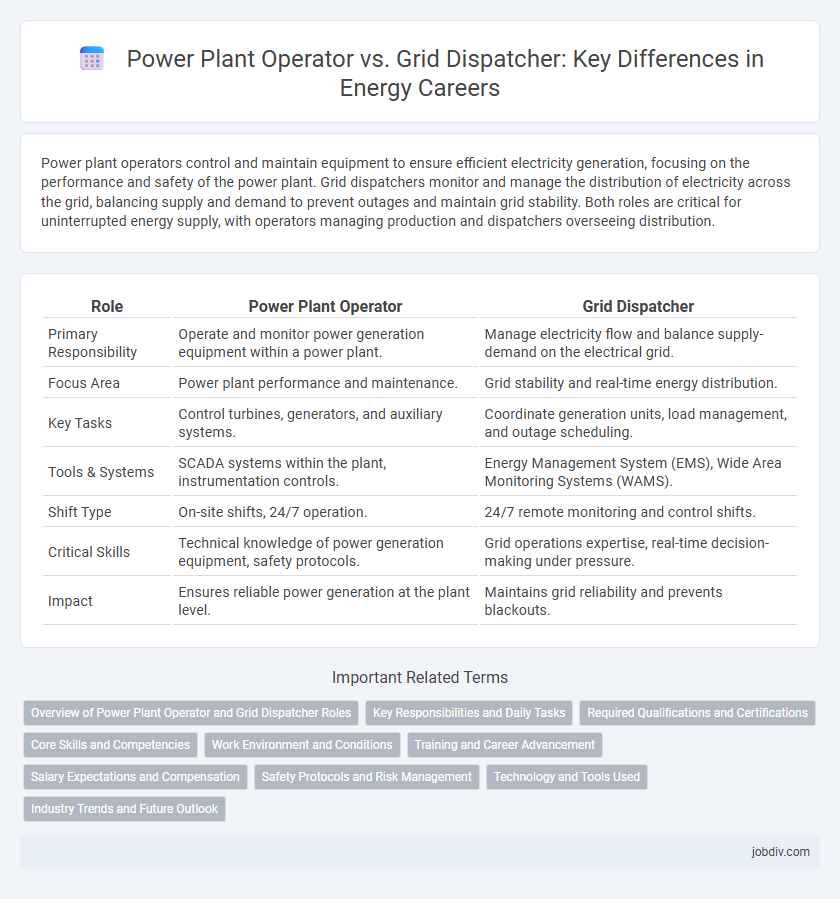Power plant operators control and maintain equipment to ensure efficient electricity generation, focusing on the performance and safety of the power plant. Grid dispatchers monitor and manage the distribution of electricity across the grid, balancing supply and demand to prevent outages and maintain grid stability. Both roles are critical for uninterrupted energy supply, with operators managing production and dispatchers overseeing distribution.
Table of Comparison
| Role | Power Plant Operator | Grid Dispatcher |
|---|---|---|
| Primary Responsibility | Operate and monitor power generation equipment within a power plant. | Manage electricity flow and balance supply-demand on the electrical grid. |
| Focus Area | Power plant performance and maintenance. | Grid stability and real-time energy distribution. |
| Key Tasks | Control turbines, generators, and auxiliary systems. | Coordinate generation units, load management, and outage scheduling. |
| Tools & Systems | SCADA systems within the plant, instrumentation controls. | Energy Management System (EMS), Wide Area Monitoring Systems (WAMS). |
| Shift Type | On-site shifts, 24/7 operation. | 24/7 remote monitoring and control shifts. |
| Critical Skills | Technical knowledge of power generation equipment, safety protocols. | Grid operations expertise, real-time decision-making under pressure. |
| Impact | Ensures reliable power generation at the plant level. | Maintains grid reliability and prevents blackouts. |
Overview of Power Plant Operator and Grid Dispatcher Roles
Power Plant Operators control and maintain equipment that generates electric power, ensuring efficient and safe plant operations while monitoring systems for optimal performance. Grid Dispatchers coordinate electrical grid operations by managing the distribution of electricity, balancing supply and demand, and responding to grid emergencies to maintain system stability. Both roles require real-time decision-making skills and a deep understanding of power generation, transmission, and distribution systems.
Key Responsibilities and Daily Tasks
Power Plant Operators manage the operation and maintenance of generators, turbines, and control equipment to ensure efficient electricity production and comply with safety standards. Grid Dispatchers monitor and control the power grid in real-time, balancing supply and demand by coordinating electricity distribution and managing outage responses. Both roles require continuous communication and data analysis to maintain grid stability and prevent blackouts.
Required Qualifications and Certifications
Power Plant Operators typically require a high school diploma or equivalent, with specialized training in mechanical, electrical, or chemical systems, alongside certifications such as the North American Electric Reliability Corporation (NERC) System Operator Certification. Grid Dispatchers must obtain a combination of technical education in electrical engineering or energy management and mandatory certifications like the NERC Reliability Coordinator or Balancing Authority certifications to ensure compliance with industry standards. Both roles demand rigorous technical knowledge and adherence to safety protocols, but Grid Dispatchers place a higher emphasis on real-time grid management credentials.
Core Skills and Competencies
Power Plant Operators possess in-depth knowledge of turbine mechanics, boiler operations, and real-time monitoring systems to ensure efficient energy production and plant safety. Grid Dispatchers excel in load forecasting, real-time grid management, and coordination of energy distribution to maintain system reliability and prevent outages. Both roles demand strong analytical skills, adherence to regulatory standards, and proficiency in advanced SCADA and energy management systems.
Work Environment and Conditions
Power Plant Operators typically work within the controlled environment of power generation facilities, often on-site in plants that operate continuously, requiring shift work and adherence to strict safety protocols due to machinery and high voltage equipment. Grid Dispatchers function in centralized control rooms, managing the distribution of electricity across vast networks, necessitating high concentration levels and the ability to respond quickly during grid emergencies, often working rotating shifts to maintain 24/7 grid stability. Both roles demand vigilance and resilience but differ in their operational focus--local plant operation versus regional or national grid management.
Training and Career Advancement
Power Plant Operators undergo extensive technical training in plant operations, safety protocols, and equipment maintenance to ensure efficient energy production. Grid Dispatchers receive specialized instruction in grid management, load balancing, and real-time system monitoring to maintain stability across the electrical network. Career advancement for Power Plant Operators often leads to supervisory roles within generation facilities, while Grid Dispatchers can progress to senior control center positions or energy system planning roles.
Salary Expectations and Compensation
Power plant operators typically earn an average salary ranging from $55,000 to $75,000 annually, with variations depending on plant type and regional demand. Grid dispatchers often command higher wages, averaging between $70,000 and $95,000 per year, reflecting the critical nature of balancing supply and demand in real-time energy distribution. Compensation packages for both roles may include overtime pay, shift differentials, and performance bonuses, with grid dispatchers sometimes receiving additional hazard pay due to the high-pressure environment.
Safety Protocols and Risk Management
Power Plant Operators implement strict safety protocols, including routine equipment inspections and emergency shutdown procedures, to minimize operational risks within power generation facilities. Grid Dispatchers focus on real-time monitoring and coordination across the electrical grid, employing advanced risk management strategies to prevent overloads and ensure system stability. Both roles require adherence to regulatory standards and rapid response capabilities to mitigate hazards and maintain continuous power supply.
Technology and Tools Used
Power plant operators utilize advanced control systems and SCADA (Supervisory Control and Data Acquisition) technology to monitor and adjust turbine performance, fuel consumption, and emissions in real-time. Grid dispatchers employ energy management systems (EMS) and state estimation tools to balance electricity supply and demand across transmission networks, ensuring grid stability and reliability. Both roles integrate smart grid technologies and IoT sensors to enhance operational efficiency and respond quickly to dynamic energy conditions.
Industry Trends and Future Outlook
Power plant operators and grid dispatchers are increasingly integrating advanced automation and real-time data analytics to enhance energy efficiency and reliability in power generation and distribution. Industry trends highlight a growing emphasis on renewable energy sources, requiring operators and dispatchers to adapt to variable output and decentralized grids. The future outlook anticipates expanded roles involving AI-driven predictive maintenance and smart grid management to support sustainable and resilient energy systems.
Power Plant Operator vs Grid Dispatcher Infographic

 jobdiv.com
jobdiv.com